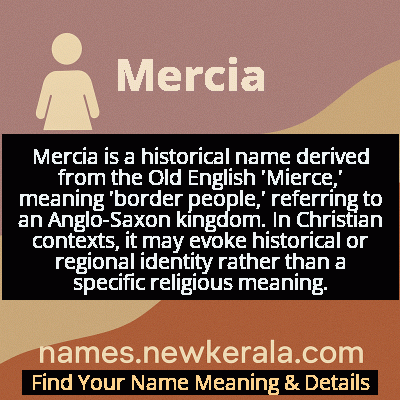Mercia Name Meaning & Details
Origin, Popularity, Numerology Analysis & Name Meaning of Mercia
Discover the origin, meaning, and cultural significance of the name MERCIA. Delve into its historical roots and explore the lasting impact it has had on communities and traditions.
Name
Mercia
Gender
Female
Origin
Christian
Lucky Number
4
Meaning of the Name - Mercia
Mercia is a historical name derived from the Old English 'Mierce,' meaning 'border people,' referring to an Anglo-Saxon kingdom. In Christian contexts, it may evoke historical or regional identity rather than a specific religious meaning.
Mercia - Complete Numerology Analysis
Your Numerology Number
Based on Pythagorean Numerology System
Ruling Planet
Uranus (Rahu)
Positive Nature
Strong sense of order, loyal, practical, and disciplined.
Negative Traits
Stubborn, overly serious, rigid, and prone to feeling restricted.
Lucky Colours
Blue, gray.
Lucky Days
Saturday.
Lucky Stones
Blue sapphire.
Harmony Numbers
1, 7, 8.
Best Suited Professions
Managers, engineers, accountants, organizers.
What People Like About You
Dependability, discipline, practicality.
Famous People Named Mercia
Mercia MacDermott
Historian and Author
Renowned Bulgarian historian specializing in medieval history and Bulgarian national revival
Mercia Tapping
Academic Administrator
Former Vice-Chancellor of Anglia Ruskin University and prominent figure in UK higher education
Mercia Leonard
Film Producer
Award-winning producer known for 'The Last King of Scotland' and other notable films
Name Variations & International Equivalents
Click on blue names to explore their detailed meanings. Gray names with will be available soon.
Cultural & Historical Significance
In Christian context, Mercia holds additional significance as the kingdom was Christianized in the 7th century, with important religious centers like Lichfield becoming prominent bishoprics. The name evokes images of medieval power, territorial integrity, and the complex interplay between pagan traditions and Christian conversion that characterized early English history. The Christianization of Mercia under King Peada and the establishment of dioceses created a lasting religious legacy that connects the name to England's Christian heritage.
Extended Personality Analysis
Women named Mercia typically exhibit strong leadership qualities, determination, and a natural authority that commands respect. They often possess a strategic mindset, able to navigate complex situations with wisdom and foresight, much like the historical kingdom's rulers who skillfully managed political alliances and territorial expansion. Their personality combines traditional values with modern adaptability, creating individuals who honor heritage while embracing progress.
Mercia's tend to be protective of their loved ones and principles, displaying loyalty and resilience in facing challenges. They often have a keen sense of justice and fairness, coupled with practical intelligence that makes them effective problem-solvers. Their strength is balanced with compassion, making them both formidable and nurturing figures in their personal and professional relationships. The historical connotations of the name often inspire bearers to develop a strong sense of identity and purpose, with many demonstrating remarkable perseverance and the ability to establish clear boundaries in their lives.
Modern Usage & Popularity
In contemporary times, Mercia remains a relatively uncommon but meaningful choice for parents seeking a name with historical depth and distinctive character. While not ranking in the top 1000 names in most English-speaking countries, it enjoys steady usage among families with Anglo-Saxon heritage or interest in medieval history. The name has seen a slight resurgence in recent years as vintage and historically significant names gain popularity, particularly among parents looking for strong, feminine names that aren't overly common. It's particularly favored in the United Kingdom, especially in the Midlands region where the historical kingdom was located, serving as a nod to regional identity and heritage. Modern bearers of the name often appreciate its unique quality and the strong, regal connotations it carries without being overly common or trendy, making it an excellent choice for parents seeking something traditional yet distinctive.
Symbolic & Spiritual Meanings
Symbolically, Mercia represents boundaries, strength, and heritage. The name evokes images of fortified borders and territorial integrity, symbolizing the ability to define and protect one's personal and emotional boundaries while maintaining connections to community and tradition. It carries profound connotations of leadership and sovereignty, reflecting the historical kingdom's powerful rulers and independent spirit that dominated Anglo-Saxon England for centuries. The transition of Mercia from pagan to Christian kingdom adds layers of spiritual transformation and faith journey to its symbolic meaning, representing the integration of different belief systems and personal evolution. The name also symbolizes cultural preservation and historical continuity, serving as a bridge between ancient traditions and modern identity that honors the past while embracing the future. For many, it represents the enduring strength of feminine power in leadership roles and the importance of maintaining cultural heritage in an ever-changing world, making it a name rich with metaphorical significance beyond its historical origins.

